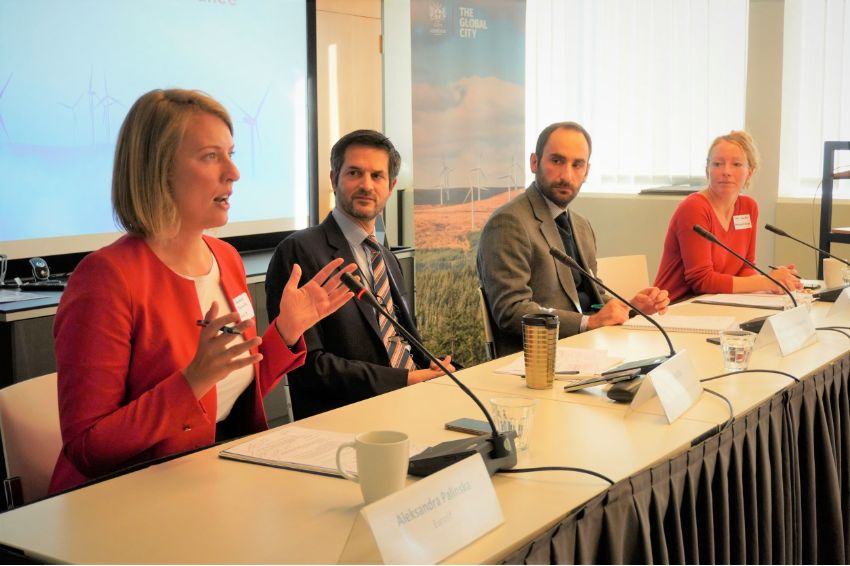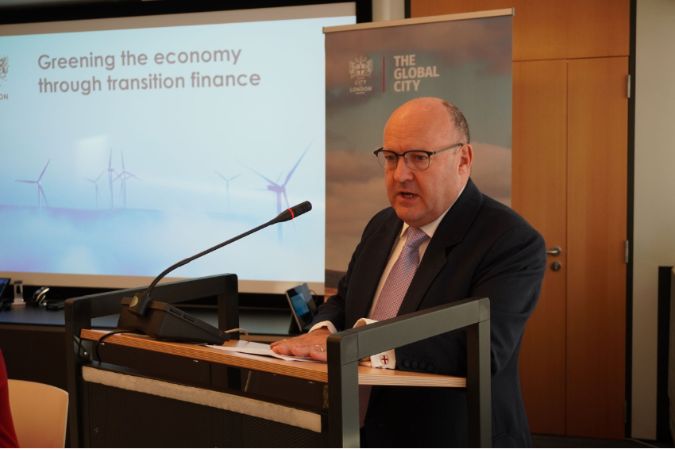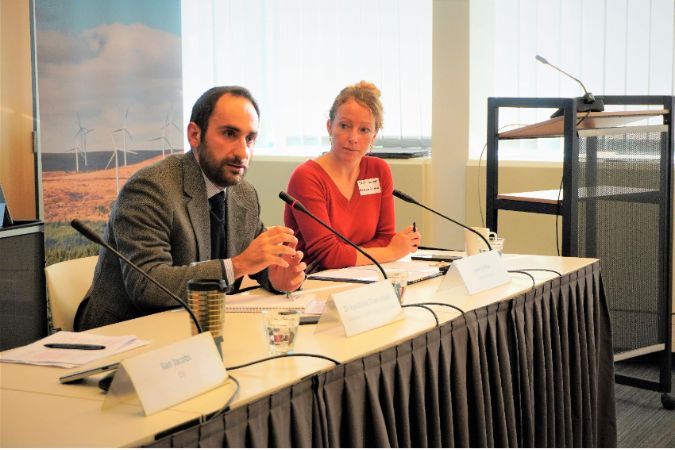Financing the green transition is mission critical for the world to meet its climate change targets. Public investment, such as the EU’s Green New Deal will play a vital role in leveraging both public and private money to help companies and countries reach ‘net zero’. However, public money alone cannot deliver the level of investment needed for the seismic change required. The European Commission estimates that half a trillion euros per year of additional investments in the EU will be needed to green its economy.

Panel (from left to right): Aleksandra Palinska – Eurosif, Ilan Jacobs - Citi, Dr Apostolos Thomadakis - European Capital Markets Institute (ECMI), Jane Gimber - FleishmanHillard
The City of London is a global leader in transition finance, its objective is for the UK to become a partner for countries and companies looking for capital and expertise to help them meet their climate goals. The City’s leading role was acknowledged at a summit organised earlier this year in preparation for the COP 27 meeting in Sharm El-Sheikh, by Mark Carney, Co-Chair of Glasgow Financial Alliance for Net Zero (GFANZ) and UN Special Envoy for Climate Action and Finance who said: “We can accelerate the transition to a net-zero economy, building on London’s role as the centre of international and sustainable finance,this summit can drive the shift from ambition to action the world needs on the path to net zero.”
You cannot just be 20% or 50% green. Europe has to be more ambitious with mandatory standards and reporting
The City of London Corporation organised a panel discussion of finance sector experts to discuss some of the challenges presented by the green transition in Brussels.
Speaking at the event, Chris Hayward, the Policy Chairman of the City of London Corporation, said: “The green transition towards a low�carbon economy will only succeed if properly financed. As home to a world-leading financial centre, the UK is in a position to support emerging markets on their net-zero journey providing a full spectrum of services, products and expertise.

Opening remarks by Chris Hayward, Policy Chairman of the City of London Corporation
“At the City Corporation, our sustainable finance objective is for the UK to become the go-to partner for countries and companies looking for capital and expertise to help them meet their climate goals.”
Capital markets are critical
Dr Apostolos Thomadakis from the European Capital Markets Institute (ECMI) said that capital markets were needed to fund the gap, but that Europe still didn’t have well developed markets in risk capital, equity or bonds. This has been an ongoing problem linked to the EU’s reliance on bank funding and its patchwork of different tax and insolvency rules, which inhibit the development of capital markets. The EU, for example, currently only attracts 10% of global venture capital funding.
The UK is in a position to support emerging markets on their net-zero journey providing a full spectrum of services, products and expertise
A banking perspective was provided by the Head of ESG Policy, Regulation and Government Affairs at Citi Bank, Ilan Jacobs who agreed: “The answer to transition finance can’t come just from the public sector, as you’ve highlighted, but it also can’t just come from banks’ balance sheets, it has to come from those deep liquid capital markets that Europe needs to develop.”
Transparency
One of Thomadakis’s concerns is that there is a proliferation of products with different ESG ratings, taxonomies and definitions that make it very difficult for retail investors to know how to invest in a greener future. Thomadakis says that further standards and harmonisation would help consumers.
Executive Director at the European Sustainable Investment Forum (Eurosif) Aleksandra Palinska welcomed the EU’s Sustainable Finance Disclosure Regulation (SFDR) which was introduced to improve transparency around claims made by those selling sustainable investment products. However, since environmental, social and corporate governance criteria were often ill-defined or not explicitly defined, products that had not been considered sustainable were now given a seal of approval leaving the financial sector open to accusations of greenwashing.

Dr Apostolos Thomadakis - European Capital Markets Institute (ECMI) and Jane Gimber - FleishmanHillard
From brown to green
Palinska also expressed concern that transitional investments are being overlooked, especially in the sectors where high energy use is difficult to abate. Broadening the green taxonomy or introducing a ‘transitional’ category would help investors enabling these sectors move from red to amber and then later to green, potentially having a significant impact on emissions.
Jacobs agreed with Palinska saying that there isn’t much difficulty in raising finance for things that are green, whereas more action is required in sectors that are brown or semi-brown and helping them to make the transition. Jacobs gave three examples of where Citi, along with other banks, have agreed on principles for funding near-term pathways to get to a zero or lower carbon future for maritime transport and more recently for steel. There is also an aviation climate aligned finance working group to find a similar approach for this difficult sector.
On the EU being a global leader, Thomadakis urged even more ambition from the EU: “I don’t think there is a middle way. You cannot just be 20% or 50% green. Europe has to be more ambitious with mandatory standards and reporting.”
The UK is also taking a leading role with the creation of a taskforce to develop an operating model for transition finance, and gold standard transition plans. Hayward added: “We have, we think, in the UK a great opportunity to lead on transition finance, especially given its existing strengths in voluntary carbon market disclosures.”
Closing this discussion, the moderator Jane Gimber, Associate Director at FleishmanHillard, thanked the panellists for the interesting and timely discussion. She underlined that transition finance will be a key focus for the coming COP 27 discussions in Sharm El-Sheikh in November.
Sign up to The Parliament's weekly newsletter
Every Friday our editorial team goes behind the headlines to offer insight and analysis on the key stories driving the EU agenda. Subscribe for free here.